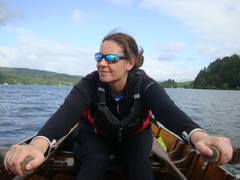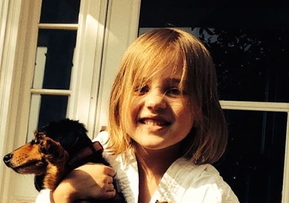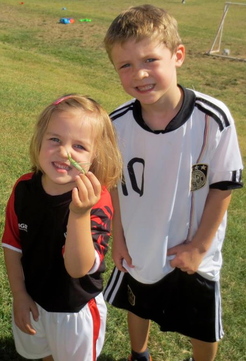 Sarah Weldon practices rowing on Lake Windemere. Sarah Weldon practices rowing on Lake Windemere. Sarah Weldon, you are planning to row around Britain solo next year. Give us some stats: How long will it take? Are you the first woman to do this? What kind of food do you eat and what do you do if the weather is bad? Will you be absolutely alone? I'll set off from Henley On Thames (home of the Team GB rowers and the oldest rowing club in the world) on the 28th May 2016, before rowing the length of the River Thames, the longest river in England. Once I reach London, I'll be rowing anticlockwise around the coast, before rowing back along the Thames and rowing to Henley On Thames. It's around 3000 miles altogether and will take me about 14 weeks, depending on weather and how many stops I make on the way to give talks at local harbors and museums. I'll be rowing around 15 hours a day split into shifts of two hours on and two hours off the oars, so the most I will ever sleep at a time is two hours. Right now, no one has ever rowed solo around Great Britain, so I hope to be the first person, or at least the first female. My food will be pre-packed, so I have one bag of food per day. Each bag will consist of three to four freeze dried meals (like the astronauts have in space), along with other foods like chocolate bars, dried fruit and nuts, or beef jerky. I'll use up around 8000 calories per day so will need to pile on the calories before and during the row. My PhD research at Roehampton University is looking at the effects of calorific stress on the body of the ocean rower, so one of the things I'll have to do is keep a count of my calorie intake and food preferences, then collect my poo samples to analyze this for fat content, to see how efficient my body is at using up fat reserves for energy. If the weather is bad, I'll likely continue rowing. My rowing area has no cover, so this could mean sitting out on deck and rowing in the rain. If the weather is really, really bad, then all I can do is sit inside the cabin, with the hatches closed, anchors out and ride it out. During this time you can't boil any water on your stove so you don't have any hot food or drinks, and you can't go for a pee as your toilet is just a bucket in the rowing area. At sea I will be physically on my own. There are no support boats following me, but I'll never be really on my own, as my team will be on the end of the satellite phone, reassuring me and giving me important information on weather routing and overcoming challenges. What do you hope to achieve with your expedition? The aim of the expedition is to bring the ocean and environment alive for the students all over the world who are following the journey live - to be their eyes and ears. I'll also be raising money for my charity Oceans Project, which provides tablet computers and education to young people who are denied access to education, often due to gender, poverty, or disability. I'm hoping to use technology in a way that has never been done before, and to collect a large volume of scientific data on the human body, as well as plastic pollution, weather and the wildlife I encounter. What's your background? Did you come from a family where education was valued and affordable? My background is neuropsychology (looking at how the biology of the brain affects behavior). Through my work I supported young people with acquired brain injuries, particularly where they were having difficulty to access school because their needs were more challenging in terms of wheelchair access, or because they struggled with memory or recall, or in language. It was through my work that I was able to travel abroad for the first time, working on projects in India, the Caribbean, Spain, Arctic, and the Amazon Jungle. On each journey I encountered young people with a passion for learning, but no opportunity, something I think I could relate to, as university wasn't an option for me on leaving school, and it was only once I was full time employed that I was able to undertake my first degree by correspondence. I've always been lucky enough to have teachers who saw education as a passport to a better life, and that has really stayed with me, especially where some of the students I have worked with have gone on to receive scholarships for university. Without education, I would have remained in poverty with few opportunities, and it's something I have seen time and time again with the young people I meet. Will this challenge be enough for you for now, or do you already have others in the works? The plan is to undertake an ocean row every year to continue raising funds for education for young people. At the moment the work I do with Oceans Project is voluntary and takes up every moment, especially as I teach classes through my Skype classroom each day, and give talks in schools. My dream would be to be paid for the work I do, so that I can really dedicate my full attention to Oceans Project. What kind of training did you have to go through? As someone who has never rowed before, I've had to learn to row, on the river and on the sea as they are different techniques. I've taken training sea survival, first aid, using a VHF radio, how to use nautical charts and to navigate, and I really wish I'd paid more attention to my physics lessons at school, because I now have to know how to fix things like the electrics on my boat, or how to install the solar panels, or to fix my water maker if the sea water damages it. The thing I wasn't so prepared for, was that I would need to know about setting up a new business or charity, so things like social media, website building, public speaking, even how to deal with the media, and to do accounts and legal forms. From a fitness angle, I do around three hours of fitness training per day, and I work with a mental strength coach and a nutritionist. I've been super lucky to be surrounded by the top people in each field, from my Lawyer Kim, to Professor Greg Whyte, and three times Olympic medalist and rower Debbie Flood. Lastly, what will you think about to get you through if you have that moment when things are tough and you really feel like quitting? Whenever things are tough, I think back to the children I have met over the years, who never gave up, and who smiled even though they were in horrendous conditions or had lived through some awful things. At the end of the day, the row and what I do is my choice, and the struggle is temporary, but the children supported by the project don't have a choice, they are dependent on me to raise the funds they need to give them access to education. Some of those children live and work on toxic rubbish dumps, and some were sold into the sex trade by their parents, and are now parents themselves at the age of 12. If they can endure what life has thrown at them, and not give up, then so can I. You can learn more about Sarah's row at: http://www.oceansproject.com Interview by Suzette Lohmeyer
0 Comments
 Bridget wears her karate uniform to play ninja at home. Bridget wears her karate uniform to play ninja at home. How important are organized sports to raising a strong, confident girl? Not really, and I’m asking because my daughter has fought off my best efforts to engage her in ballet, soccer, baseball, basketball and karate. She did stick with karate for a while, but toward the end she managed to find a place for herself sitting on the side as the teacher’s assistant. She’s very active, but on her own terms, leaving me to coerce, drag, and bribe her onto fields and courts for the last two years. She’s not interested. On the soccer field she chased bugs and picked flowers. At baseball she dropped the bat mid practice and went to the playground, and in ballet she came out of class halfway through and declared, “I am just not a ballerina.” During my latest epic fail, as my son calls it, I enrolled her in a tennis camp. By day 3 we had the following conversation: Her: I am not going to tennis today. Me: Why not? Her: I have to run when they tell me to run. Why should I run if I don’t want to? I like to run when I want to run. Me: But you’re all signed up and paid for. You can learn how to play tennis!! Meet friends! Running is good for you all the time! Her: I have friends. I’m not going. Me: Ice cream afterwards? Her: No. I always participated in sports, falling into the category of ‘A for effort.’ But I never minded. I liked being part of a team. I prefer organized exercise, and, as an introvert, it was a great way to socialize while not having to stand still, stare at someone and make constant conversation. I have never insisted, and don’t expect, kids who qualify for travel teams and win scholarships. But an organized sport, any sport (ping pong welcome!), seems to be a key part of a girl’s development as the headlines say about studies screaming across every parenting website and throwing me into a panic. And this isn’t recent news. Reports over the past decade have consistently shown that sports and health, academics and job placement, are directly related for both girls and boys. Although no one could say for a number of years whether it was that kids more likely to focus on academics would also do sports or if it was the sports driving the academic success. That was until Betsey Stevenson, an economist at the Wharton School of the University of Pennsylvania, released a study showing that it is in fact the sports that are helping girls do well. “It’s not just that the people who are going to do well in life play sports, but that sports help people do better in life,” she told The New York Times who reported on the study. “While I only show this for girls, it’s reasonable to believe it’s true for boys as well.” A separate study mentioned in the same article, conducted by Robert Kaestner, an economics professor at the University of Illinois at Chicago, showed a direct link between greater opportunities for girls to participate in sports (Title IX) and lower obesity rates in adulthood. As a parent, I have seen sports help kids focus their energy, become confident, develop respect for the process of practice makes better which is key in an ever-increasing instant gratification society, and just learn how to win and lose gracefully. Karate has done wonders for my son’s self-esteem. Can a girl get these core values somewhere else? And where do I go for that answer? My sister, Dr. Tracy McLoone, of course, who is on my speed dial for any child or outfit related issue. Thankfully, to appease the lazy journalist in me, she has spent years studying how girls think, has a PhD, taught university-level courses in global women's leadership, and written and completed research on girls and media. Her bottom line is to chill out. Organized sports aren’t the only way girls can help their self-esteem along. For some kids, that just isn’t the path that comes naturally, or for that matter, is best for them. She explains, “It is easy to see how organized sports might help to promote self-esteem in girls, but they're certainly not the only way. Positive self esteem is an attitude we can build with practice; if self esteem is owning our value when we achieve and when we don’t excel - and learning how not to think of ourselves as permanent failures when we try something and completely mess up - there are many other activities through which to promote self esteem. Some examples: fine arts, science experiments, plant care, financial savvy, creative writing and cooking. Not all girls will take to organized sports (or for that matter, organized anything), and sports don’t always need to be organized: some kids will find joy and pride in swimming, running, basketball - whatever - without all the trappings of uniforms and medals.” So the bottom line seems to be that girls and sports are a fantastic combination, but if you have a girl not at all interested, don’t despair. There are other ways for her to develop a strong sense of worth. For now, I will try to relax about her future and let her do the activities she wants to do. I will probably throw in the benefits of team sports into conversation once in a while just in case she changes her mind, but I have a feeling this is more of a personality trait rather than a phase. Maybe the self-esteem is already there in that she knows exactly who she is, and what she does and doesn’t want to do. As long as she keeps that, I think we’ll be fine. By Suzette Lohmeyer
|
Archives
June 2017
Categories
All
|

 RSS Feed
RSS Feed